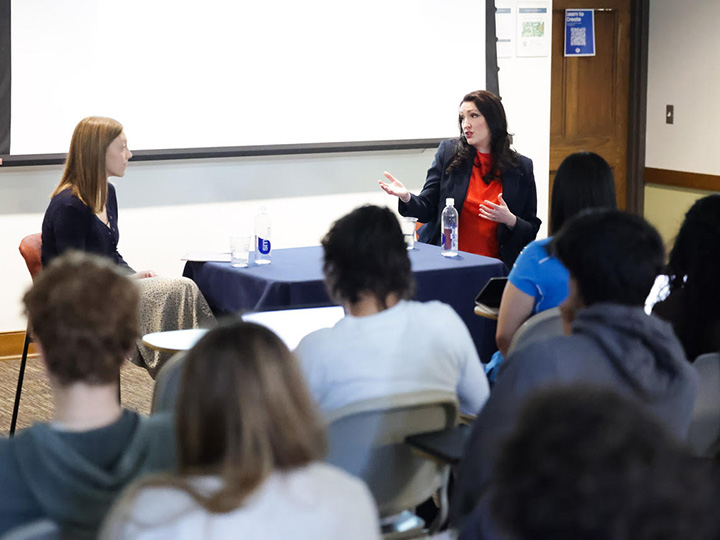Global Irish Studies Initiative Carries Forward Georgetown’s Irish Culture and History
Founded by Irish and Irish-American leaders, including Archbishop John Carroll, S.J., the first Roman Catholic bishop in the United States, Georgetown University has long-standing roots in Irish culture. But Irish culture isn’t just part of Georgetown’s history—it remains a living presence on campus today exemplified by the university’s Global Irish Studies Initiative.

Exploring Ireland’s Global Connections
The Global Irish Studies Initiative at Georgetown University (GIS), founded in 2017 and supported by the College of Arts & Sciences, aims to engage the Georgetown community and explore Ireland's global connections through an interdisciplinary lens. Whether through literature, history, or global politics, students from across the university encounter Ireland as a site of inquiry that transcends ethnic or national ties.
Cóilín Parsons, director of GIS and associate professor in the Department of English in the College of Arts & Sciences, explains how the Georgetown community thinks critically about Ireland in a global context.
“Students and faculty and community members are eager to go beyond the headlines and the stereotypes and learn about Ireland as a modern country where questions about everything from identity and citizenship to economic growth and health care are being answered in complex and innovative ways.”
This curiosity reflects the GIS mission, which encourages students to engage Ireland as both a distinctive national case and a comparative model for global challenges. Irish culture and history hold a unique place in understanding broader global patterns of migration, conflict, and identity. The mass emigration from Ireland, caused primarily by the Great Famine in the 1800s, helped form some of the largest and most influential diaspora communities in the world. Understanding Irish history allows for a greater understanding of how nations grapple with questions of sovereignty and global integration.
Katherine Capuano (N’26), a senior in the Berkley School of Nursing and a member of the Georgetown University Irish-American Society’s Irish dance team, emphasizes the value of learning about and sharing Irish culture in a global context.
“The Irish have so many ties with other cultures. Getting to learn about your own Irish culture and history allows you to learn more about other cultures and their pasts.”
By framing Irish studies as an avenue for comparative and interdisciplinary inquiry, Georgetown’s approach is reshaping how Ireland’s global role is understood. Parsons emphasizes that “there is no other program in the world that is focused on the comparative study of Ireland,” pointing to GIS courses that link Ireland to South Africa, Germany, and postcolonial museum cultures.

Fostering Transatlantic Dialogue
One of the leading initiatives of GIS is “Bridging the Atlantic,” an annual policy conference hosted with the BMW Center for German and European Studies in collaboration with the Embassy of Ireland, the University College Dublin Clinton Institute, and Queen's University Belfast. Over the years, the conference has featured many impressive speakers—from lawmakers and ambassadors to trade experts and policy leaders—including former U.S. President Bill Clinton.
Parsons explains the impetus for the conference, which began in 2019 in the wake of the Brexit vote and withdrawal of the United Kingdom from the European Union.
“The conference was conceived as a way to gather policymakers and academics from both sides of the Atlantic to consider the pressing issues of the day, with an eye to the fact that Ireland really is the most effective bridge between Washington and Brussels.”
Recognizing a Complex History
Despite the positive impact Georgetown’s Irish heritage continues to have on campus today, it also carries a complex and painful history. Some of the Irish and Irish-American individuals who helped shape the university’s early foundations also contributed to Georgetown’s history of enslavement.
GIS has tried to find a way to mark the deep connections between Georgetown and Ireland, but in a way that honors the complex history of the university. For example, in April 2025, GIS hosted an Ireland and Atlantic Slavery Symposium. Parsons also shared that GIS plans to “build up a research network within and outside the university to develop the still under-explored topic of Irish [and] African American relations in particular,” inspired by faculty experts such as Chandra Manning, professor in the Department of History, and Patrick O'Malley, professor in the Department of English.
Learning from Each Other
Looking ahead, Parsons sees further opportunities for GIS to evolve by facilitating collaboration with universities in Ireland not only in the humanities but in areas such as biomedical engineering and artificial intelligence. He also hopes to build on the already strong culture of study abroad exchange between Georgetown and universities such as Trinity College Dublin and University College Dublin. He emphasizes the importance of such cross-cultural exchange opportunities.
“With Georgetown's location in the capital of the country with the largest Irish diaspora, and with Ireland's place as the only English-speaking country remaining in the European Union, we have so much to learn from and share with each other.”
